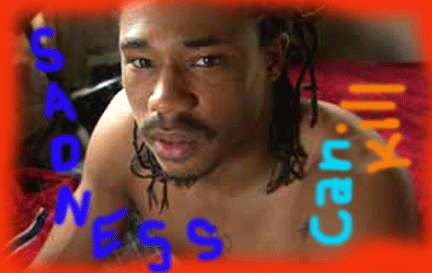
PBS has produced an excellent documentary called Depression: Out of the Shadows. It takes a look at the approximately 18.8 million American adults that the National Institute of Mental Health estimates have a depressive disorder. And that 18.8 million doesn’t include the increasing number of adolescents being diagnosed with depressive conditions.
The program—which may be watched either in its entirety, or segment by segment online—was drawn to my attention by one of it’s subjects, a former gang member-turned author named Dashaun “Jiwe” Morris. (We were on a panel together at the LA Times Festival of Books and have kept in touch.)
Each of the segments is fascinating. For instance, segment six covers two aspects of the issue: the prevalence of—and the denial about—depression among African- Americans, and the stigma against depression in the corporate world.
For my purposes, however, I found segment five, featuring Jiwe, to be particularly significant as it relates childhood trauma to depression—and then, in Jiwe’s case, shows how trauma-based depression can produce violent and self-destructive behavior in children and adolescents.
“All the while, we [were] living suicidal every single day of our lives,” says Jiwe in the segment, “because we [were] out on these streets with people gettin’ murdered every day. It’s just a different form of suicide.”
During the years that I was first researching gang violence in the early to mid 1990’s, I got to know a lot of kids in gangs. Then in a frightening number of instances, I later went to their funerals. After about four years of the research, I began to wonder if a great many of those deaths—all but one by homicide—were really a form of back-door suicide. My friend Father Greg Boyle has often remarked about the same thing.
Now that all the research about the prevalence of Post Traumatic Stress Disorder among inner city children and adolescents has emerged in repeated studies, I have become more and more convinced that gang violence isn’t just a public health problem to be viewed from an epidemiological perspective, as many of us have been saying, but it is also a mental/emotional health crisis.
If we are to be successful with intervention and prevention, that’s one of the ways we must address it.

I can appreciate the need for treating depression, but let’s concentrate efforts on our own citizens and send others back to Mexico to let that country deal with their’s. (Oops. Did I bring up illegal immigration?)
Anyway, the program is probably worth viewing, even though it is through PBS and probably (don’t know yet) offers excuses for violent street crimes.
The Democrats depress me. What can we do to stop them?
Celeste, your link to segment 5 goes to segment 6, even though one can jump to all of them from that page. Here’s the correct link to segment 5 featuring Jiwe: http://www.pbs.org/wgbh/takeonestep/depression/video-ch_05.html
Thanks, Woody. Fixed it.